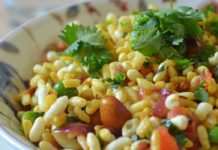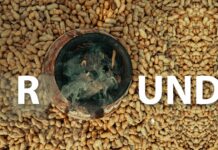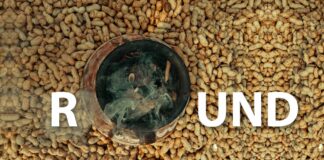India’s Independence Day, celebrated on August 15th, is a truly remarkable moment in history that carries immense importance for both the nation and its people.
On this auspicious day, we commemorate the end of a challenging and lengthy journey towards liberation from British colonial rule. As we revel in this significant milestone, let’s explore the fascinating history and the unifying spirit that have played a pivotal role in shaping India into the vibrant and diverse country we know today.
India has been making impressive strides in the direction of sustainable growth and development across various sectors. This concerted effort aims to address the complex challenges that encompass environmental, social, and economic aspects.
India’s determination to achieve sustainable growth shines through its active participation in global environmental initiatives and the adoption of policies that are in line with the United Nations Sustainable Development Goals (SDGs).
While there are undoubtedly obstacles on this path, India’s ongoing commitment to sustainable development is a testament to its ever-evolving approach, with the ultimate vision of forging a greener and more resilient future for all.
Highlighting recent developments, Prime Minister Shri Narendra Modi inaugurated the Global Millets (Shree Anna) Conference in New Delhi in March 2023. This event coincides with the United Nations General Assembly’s decision, taken during its 75th session in March 2021, to designate 2023 as the International Year of Millets (IYM 2023).
This special year holds a twofold purpose: firstly, to encourage the sustainable cultivation of millets, underscoring their role in a balanced ecosystem; and secondly, to spotlight the potential of millets in creating fresh and sustainable market opportunities that can benefit both producers and consumers alike.
How awesome is it that India’s dedication falls right in line with the world’s celebration of the International Year of Millets!
Millets, these small-grained, warm-weather cereals, have been a part of India’s dietary heritage for centuries. But with the arrival of the green revolution, the focus shifted to high-yield wheat and rice, and millets were sort of pushed backstage.
Picture this: Jowar, Bajra, and Ragi – these are some of the star millets cultivated in India. But wait, there’s more! We also have the lesser-known champions like Proso, Kodu, Fox tail, Barnyard, and little millet making their mark in our country.
Millets are like the superheroes of the semi-arid tropics. They thrive in areas where other crops struggle due to low rainfall and not-so-fertile soil. Plus, they’re like a treasure trove of nutrients compared to other major cereals, ensuring we’re well-fed and nourished. These champs also have a cool ability to withstand tough times, like drought and wild weather.
Now, let’s talk about the current scene. As lifestyle diseases and the hunt for healthier diets gain traction, more folks are considering millets as a great alternative to the usual wheat and rice. And guess what? With the whole COVID-19 situation, people from cities to villages are turning to millets for their nutritional boost and immunity-building powers.
So, let’s get down to the types of millets. We’ve got Sorghum (Jowar), Pearl Millet (Bajra), Finger Millet (Ragi/Mandua), and the Minor Millets – Foxtail Millet (Kangani/Kakun), Proso Millet (Cheena), Kodo Millet (Kodo), Barnyard Millet (Sawa/Sanwa/ Jhangora), Little Millet (Kutki), and two Pseudo-millets, Buckwheat (Kuttu), and Amaranthus (Chaulai).
But why are millets so important, you ask?
1. When others give up, millets stand strong. In a world grappling with climate challenges and limited resources, millets are the warriors offering a solution. These hardy grains can handle tough conditions, providing food when other crops can’t.
2. A feast of nutrients. Millets bring antioxidants, minerals, and protein to the table. With various types and amounts of fiber, they play a role in keeping our digestive system, blood sugar, and lipids in check. Plus, they’re gluten-free and have a low-glycemic index, making them a perfect choice for folks with dietary restrictions.
3. Climate champs. Drought-resistant and tough against pests, millets laugh in the face of climatic hardships. Their minimal needs and adaptability to weather shocks can transform local farming systems, making them more robust and inclusive.
4. Helping the little guys. By promoting the production and consumption of millets, we can give small-scale farmers a boost. As dietary preferences shift, millets have the chance to regain popularity and provide livelihood opportunities.
5. Spice up the food scene. Millets add a dash of diversity to the global food system. When unexpected crises hit the grain market, millets can step in as a dependable alternative.
6. Infinite possibilities. Millets’ genetic diversity opens doors to innovative uses, from therapeutics to pharmaceuticals. This versatility brings new market opportunities to the table.
As we wrap up, let’s remember the tricolour fluttering on India’s Independence Day. It’s a symbol of unity, hope, and the indomitable spirit of our people. It’s a testament to the power of perseverance, even in the face of challenges.
Happy Independence Day to all fellow Indians, whether you’re at home or across the globe!
Let’s celebrate our hidden treasures and the real wealth that is our diversity and resilience.
Recipes
#1 TRICOLOUR CHUTNEYS
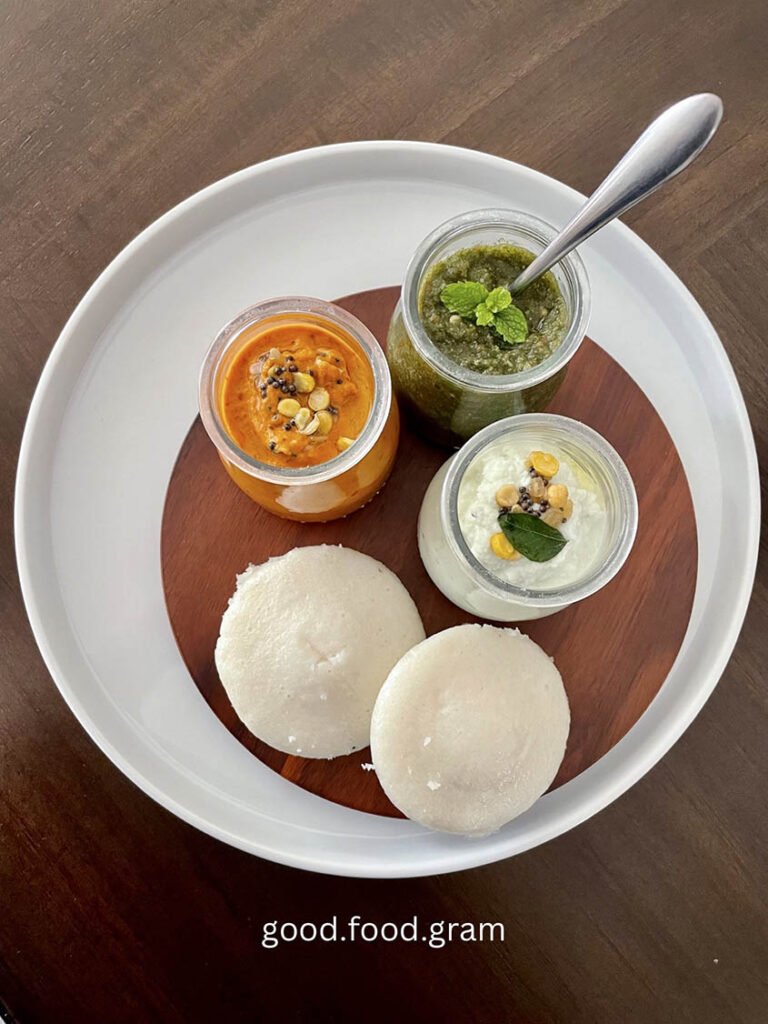
a) TOMATO (ORANGE CHUTNEY)
Ingredients:
Onion – 1 diced
Tomatoes – 2 diced
Coconut Oil – 1 Tablespoon
Ginger – 1 inch piece
Garlic – 3 cloves
Dry Red Chilies (Kashmiri Laal Mirch) – 3-4
Salt – as per taste
Water as required
Method:
– Heat oil in a pan and add ginger, garlic, dry red chilies to it. Stir it till it turns fragrant
– Then add diced onion and tomatoes, let it sauté at low to medium flame.
– In 5 minutes, the mixture becomes mushy. Let it cool, now add salt and grind it using a blender. Add water if required. Tomato/Orange chutney is ready.
b) COCONUT (WHITE CHUTNEY)
Ingredients:Coconut – 1 cup chopped
Roasted Bengal Gram/ Chana Dal – 1/4 cup
Ginger – 1 inch piece
1 green chilli
Salt – as per taste
Water as required
Method:
– Add roasted Bengal gram, chopped coconut, ginger and green chilli to a blender. Add salt and water and blend it well.
– Adjust the consistency by adding more water if required. Coconut/white chutney is ready.
c) CORIANDER (GREEN CHUTNEY)
Ingredients:
Coriander leaves – 2 cups
Lemon juice – 1/2 Lemon
Mint leaves – 8-10
Green Chilies – 4-5 or as per taste
Garlic – 3 cloves
Salt – as per taste
Water as required
Method:
– Add coriander, mint, green chillies, garlic to a blender. Add salt as per taste and blend it all together.
– Add water to adjust consistency, finish with squeezing juice of half lemon to it and mix well. Green chutney is ready.
FOR TEMPERING TOMATO & COCONUT CHUTNEY
Ingredients:
Coconut oil – 2 tsp
Asafoetida – a pinch
Mustard Seeds – 1/2 teaspoon
Roasted Bengal gram – 1 Tsp
5-7 Fresh curry leaves
Method:
– Heat oil in a pan, add asafoetida, mustard seeds, roasted Bengal gram and curry leaves in the same order and let it splutter and turn fragrant.
– Pour the sizzling tempering on Tomato and Coconut chutney.
Serve the Chutneys with piping hot Idlis/Dosa for a complete and comforting meal. Happy Cooking!
#2 TRICOLORED MILLET PASTA
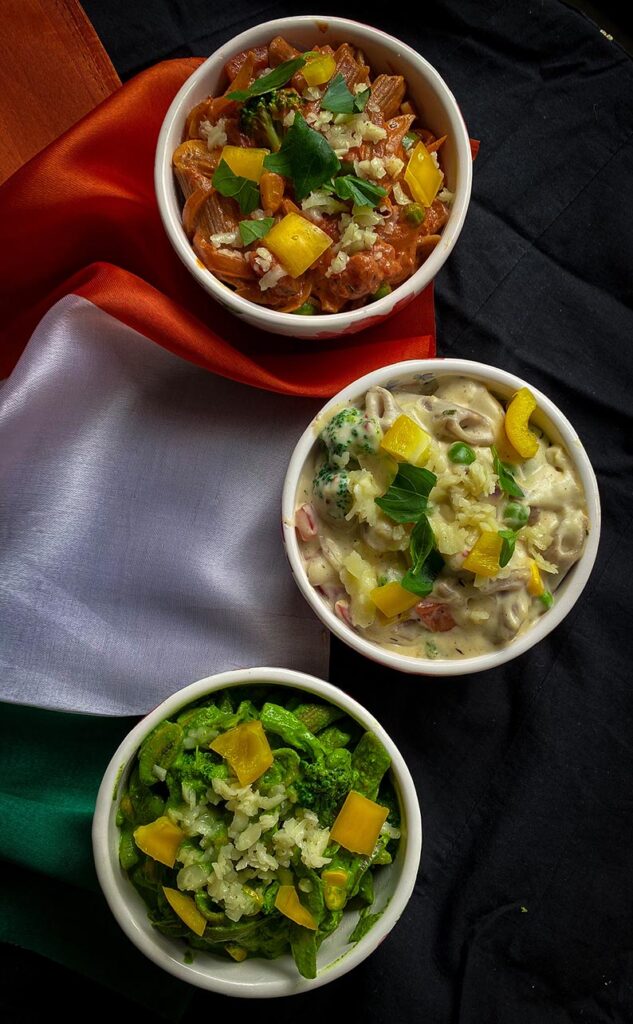
a) MARINARA CREAM PASTA (Orange Pasta)
Ingredients-
Cooked whole millets pasta –1 cup
For the sautéed veggies:
Onion sliced- ¼ Cup
Green Bell Peppers- ¼ Cup
White Mushrooms sliced – – ¼ Cup
Yellow Corn Boiled –2-3 Tbsp
Boiled Green Peas –2-3 Tbsp
Garlic minced – 2 tsp
Mixed Italian Herbs – 2 Tsp
Red Chilli flakes – 2 Tsp
Olive Oil –2 Tbsp
Marinara Sauce – 1 Cup
Fresh Cream – ½ Cup
Salt as per taste
Fresh Basil leaves for garnish
Mozzarella Cheese for garnish.
Method:
For the pasta:
Cook as per the instructions on the box.
For the Sauté:
In a pan, heat olive over medium heat.
Add the garlic and sauté until raw aroma fades.
Add the veggies and sauté for 5-6 mins on medium heat.
Add the mixed herbs along with red chilli flakes. Mix well.
Add the cooked pasta, along with marinara sauce, cream and salt. Mix all well and keep aside.
Garnish with cheese and basil leaves. Enjoy the hot creamy pasta.
b) VEGGIES IN WHITE SAUCE (White Pasta)
Ingredients
Cooked whole millets pasta – 1 cup
For White Sauce:
Whole Wheat 3 Tbsp
Milk 2 Cups
Olive oil 2 Tbsp
Black Pepper Powder 2 Tsp
Salt as per taste.
Shredded Cheese ½ Cup
For Veggies:
Onion sliced- ¼ Cup
Blanched Broccoli Florets – ½ Cup
Green Bell Peppers –¼ Cup
Boiled Peas – ¼ Cup
Minced Garlic – 2 Tsp
Olive Oil – 2 Tsp
Mixed Herbs – 2 Tsp
Salt as per taste
Fresh Cream – 2-3 Tbsp
Fresh Basil leaves for garnish
Mozzarella Cheese for garnish.
Directions:
For the pasta:
Cook as per the instructions on the box.
For the Sauté:
In a pan, heat olive over medium heat.
Add the garlic and sauté until raw aroma fades.
Add the veggies and sauté for 5-6 mins on medium heat.
Add the mixed herbs along with red chilli flakes. Mix well.
Add the cooked pasta, along with white sauce and cream. Mix all well.
Garnish with cheese and basil leaves. Enjoy the hot creamy pasta.
c) SPINACH WALNUT CREAM PASTA (Green Pasta)
Ingredients:
For Green Sauce:
Blanched spinach – 1 Cup
Basil leaves –¼ Cup
Green Chillies – 2 Small
Walnuts 4-5 nos.
Cream – 2 Tbsp
Lemon Juice -3 Tsp
Salt as per taste
Garlic 2-3 pods
For Veggies:
Onion sliced- ¼ Cup
Boiled Corn – ¼ Cup
Yellow Bell Peppers – ¼ Cup
Minced Garlic – 2 Tsp
Mixed Herbs – 2 Tsp
Red Chili Flakes 2 Tbsp
Salt as per taste
Fresh Cream – 2-3 Tbsp
Olive Oil – 2 Tsp
Fresh Basil leaves for garnish
Mozzarella Cheese for garnish.
Directions:
For the pasta:
Cook as per the instructions on the box.
For the Green Sauce:
In a blender add blanched spinach, basil leaves, walnuts, green chili, garlic pods, fresh cream, salt, lemon juice and little water. Blend well into sauce. Keep aside.
For the Sauté:
In a pan, heat olive over medium heat.
Add the garlic and sauté until raw aroma fades.
Add the veggies and sauté for 5-6 mins on medium heat.
Add the mixed herbs along with red chilli flakes. Mix well.
Add the cooked pasta, along with green sauce and cream. Mix all well.
Garnish with cheese and basil leaves. Enjoy the hot creamy pasta.
#3 MILLET QUINOA DOSA
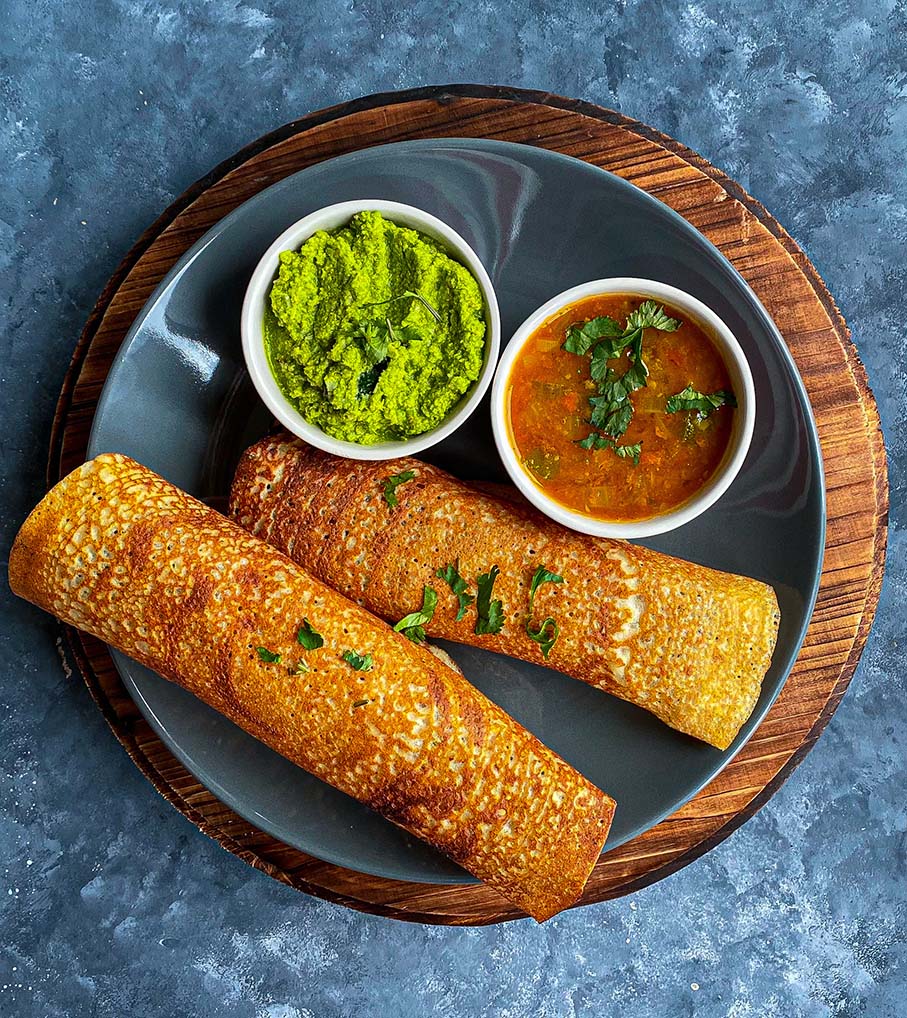
Ingredients
Quinoa ½ Cup
Jowar pearls ½ Cup
Urad Dal ½ Cup
Moong Dal¼ Cup
Chana Dal ¼ Cup
Fenugreek Seeds (Methi) 2 Tsp
Onion ½ no.
Oil to make Dosas.
Method:
Soak all ingredient in warm water for 2-3 hours.
Add all the ingredients in the blender jar along with onion.
Add 1/4 Cup water to blend well.
Remove the mixture in a big bowl. Add salt as per taste and 1-2 Tsp of oil and mix well. Keep it covered for 15-20 mins.
Add 1 ladle of batter and spread on the pan making thin dosas.
Cook evenly in both sides and serve hot with chutney and Sambar.
#4 CHOCO MILLET ENERGY BALLS
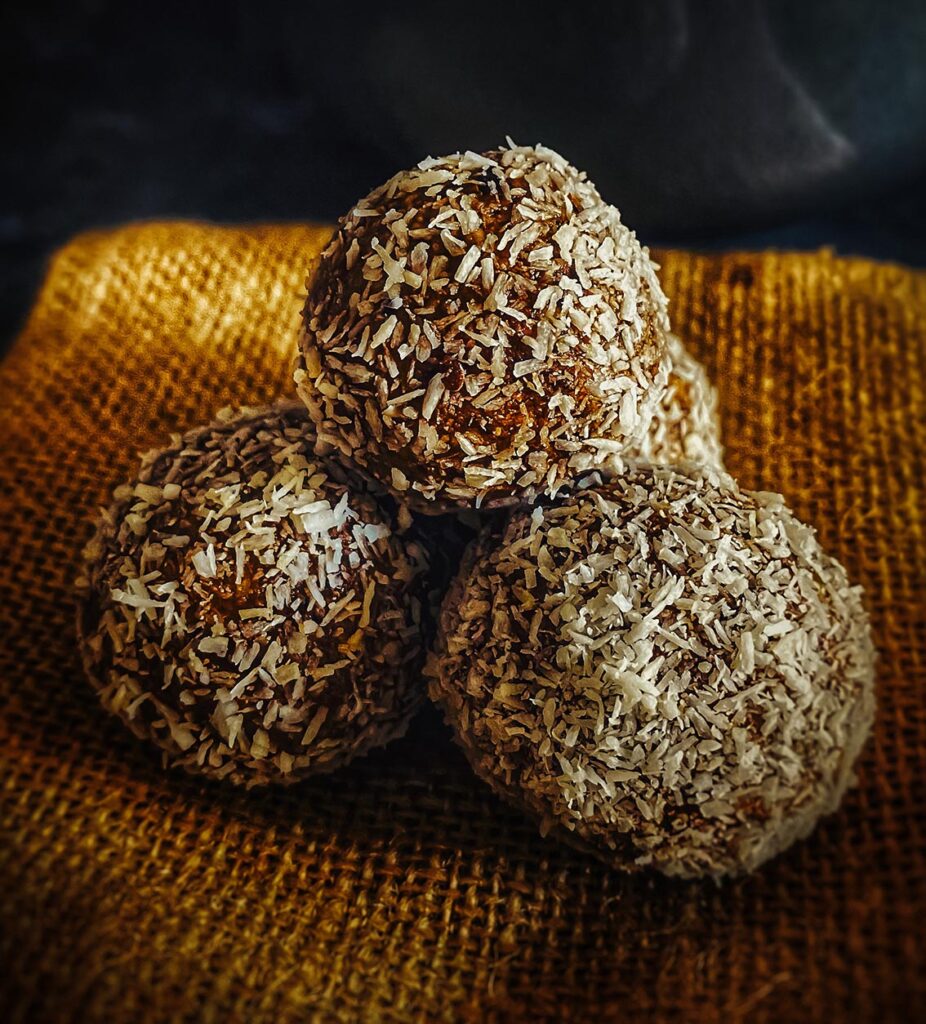
Ingredients:
Almonds 8-10 nos.
Walnuts 6-7 nos.
Choco chips ¼ Cup
Dates½ Cup
Peanut butter 3 Tbsp
Cranberries ¼ Cup
Flaxseeds ¼ Cup
Oats ¼ Cup
Ragi ½ Cup
Coconut ¼ Cup
Honey 3 Tbsp
Directions:
Dry roast Coconut, Ragi, flaxseeds and Oats separately. Keep aside to cool them.
In a food processor, add all ingredients and pulse until dough is formed.
Take 1 tsp of the dough and form small bite sized balls.
Refrigerate for 30-mins.
Store them in air tight container. Enjoy this healthy, kid-friendly, nutritious snack. For long lasting preservation, keep it refrigerated.
#5 WHEAT BREAKFAST PORRIGE
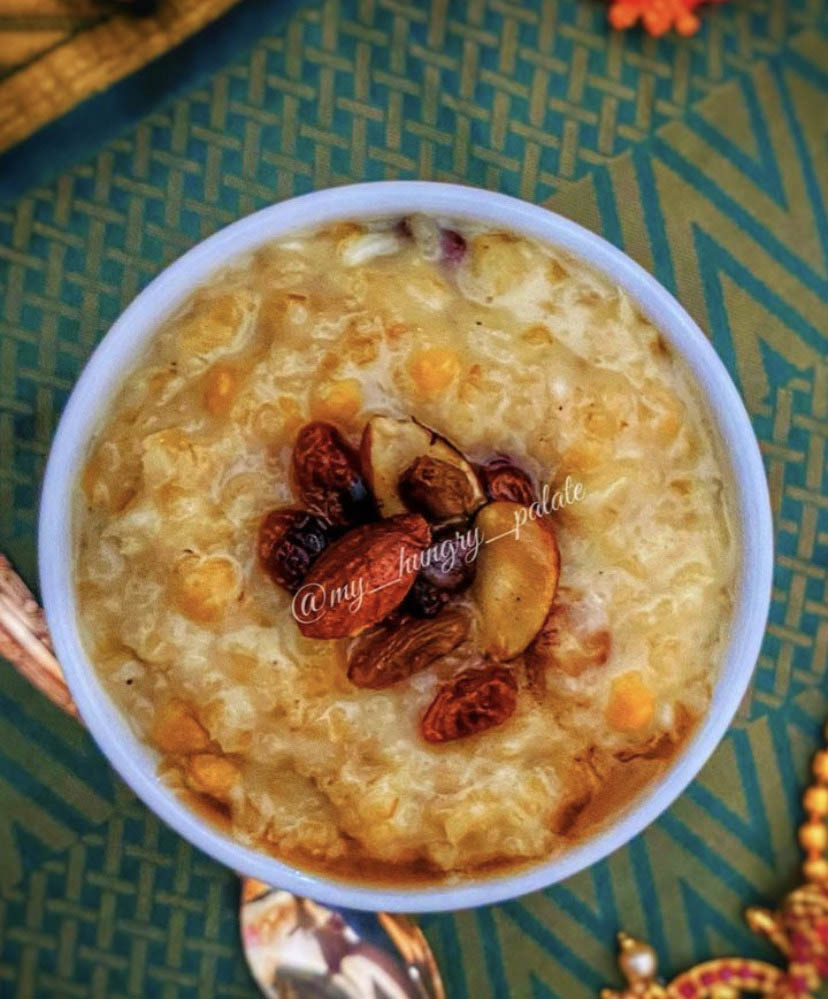
Ingredients:
Broken Wheat – 1 Cup
Chana Dal –¼ Cup
Rice – ¼ Cup
Jaggery –1 ¼ Cup
Cardamom Powder –2-3 Tsp
Dry Fruits of your choice – ¼ Cup
Milk – ½ Cup
Coconut shredded – ¼ cup
Ghee – 2-3 Tbsp
Method:
Wash the chana dal, rice and broken wheat properly. Pressure cook it properly. Keep aside to cool down.
In a pan heat ghee and roast the dry fruits and remove it in a bowl. Keep aside.
Now turn the heat on low flame and add the ghee and melt the jaggery and then add the cooked broken wheat-chana dal- rice mixture to it. Mix all well.
Add the cardamom powder to it. Remove from the heat. In a separate pot, heat the milk and cream together. Add the milk to the mixture slowly and stir well.
Do not add the milk while on heat or it might turn slightly sour. Finally add the dry fruits – cashews, almonds, raisins etc. Mix everything well. Enjoy this hot bowl of healthy porridge.
Also Read : Celebrating Unsung Stories on this Independence Day
ABOUT THE BLOGGERS:

I’m Shreyasi Kulkarni, hailing from Pune, Maharashtra. Raised in a family that’s passionate about food, especially traditional Karnataka cuisine, passed down through generations.
My blog, @Hungry.Palate, embodies the essence of Food, Family, and Fun. It’s a vibrant space filled with mouthwatering, wholesome, and easy-to-make vegetarian recipes, complete with cooking videos and helpful tips. The recipes celebrate the richness of real, healthy food, and my love for cooking and sharing delicious meals.
I’m inspired by the cultural diversity and culinary delights of the region, where iconic dishes like Sujata Mastani, Misal, and Bakar wadi bring joy to everyone.
Though I wish I had access to the ancient cookie recipes my mom mentioned, I’m thrilled to create a digital haven where food enthusiasts can indulge in flavorful delights while embracing the joy of family and good company.

Hello, I am Prachi Pandey. The face behind @good.food.gram
Born and raised in India, now I am settled in Canada with my husband and our lovely daughter. I am a Recruiter by the day and I love spending a lot of time being consumed by food. Cooking, Clicking and eating it, so you can say that I am a gastronomy enthusiast by choice.
My Instagram page is a brainchild of all my small, big and exclusive food related experiences and an effort to showcase the knowledge handed down from generations. Hope you like it and include some of these recipes in your labour of love to organize a well-balanced and delicious meal for your Family & Friends.
Article is written by Shreyasi Kulkarni @Hungry.Palate
Article is Curated by Vaibhav and his Instagram id is @frameshade
You can follow “THE UNCOMMON BOX” on the following social channels


















